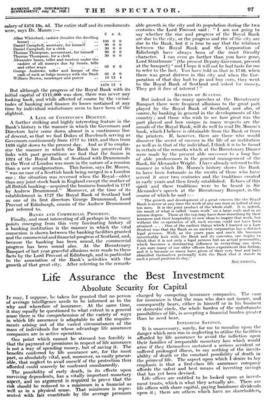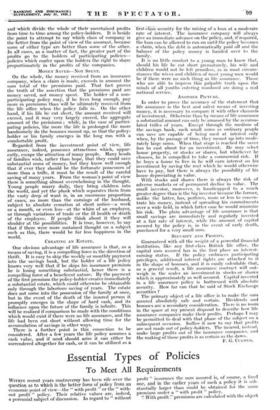Life Assurance the Best Investment
Absolute Security for Capital
IT may, I suppose, be taken for granted that no person of average intelligence needs to be informed as to the why and wherefore of insurance. At the same time, it may equally be questioned to what extent in a general sense there is the comprehension of the variety of ways in which life assurance is adaptable to all the require- ments arising out of the varied circumstances of the mass of individuals for whose advantage life assurance companies are in active operation.
One point which cannot be stressed too forcibly is that the payment of premiums in respect of life assurance is not a way of spending money, but of saving it. The benefits conferred by life assurance are, for the most part, so absolutely vital, and, moreover, so easily procur- able, that neglect to avail oneself of the protection thus afforded could scarcely be confessed unashamedly.
The possibility of early death, in its effects upon surviving dependents, has a vitally important monetary aspect, and no argument is required to prove that the risk should be reduced to a minimum in a financial as well as in a physical sense. That minimum is repre- sented with fair exactitude by the average premium charged by competing insurance companies. The case for insurance is that the man who does not insure, and consequently bears, either in himself or in his business or domestic circle, the whole burden of the unfortunate possibilities of life, is accepting a financial burden greater than he need bear.
INVESTING SAVINGS.
It is unnecessary, surely, for me to moralize upon the danger which men run in neglecting to utilize the facilitieq afforded by life assurance to avoid the infliction upon their families of irreparable monetary loss which would arise if they themselves sustained a serious accident or suffered prolonged illness, to say nothing of the inevit- ability of death or the constant possibility of death in the prime of life. The aspect upon which I desire to lay emphasis is that a first-class life assurance company affords the safest and best means of investing savings that has yet been devised. Life offices are entitled to be looked upon as invest- ment trusts, which is what they actually are. There arc life offices with share capital, paying handsome dividends upon it ; there are others which have no shareholders, and-which divide the whole of their -ascertained profits from time to time among the policy-holders. It is beside the point to attempt to say which class of company, is the better from the point of view of the assurant, because some of either type are better than some of the other. In all cases, as a matter of fact, the greater part of the profits go to the holders of -participating policies— policies which confer upon the holders the right to share proportionately in the profits of the companies.
MONEY SAVED-NOT SPENT.
On the whole, the money received from an insurance company, when a claim is made, exceeds in amount the sum total of the premiums paid. That fact proves the truth of the assertion that the premiums paid are money saved, not money spent. The holder of a non- participating policy may, if he lives long enough, pay more in premiums than will be ultimately received from the life office when the policy falls in. On the other hand, if his life be cut short, the amount received will exceed, and it may very largely exceed, the aggregate amount of the premiums ; while, in the case of partici- pating policies, the more the life is prolonged the more handsomely do the bonuses mount up, so that the policy- holder or his family emerges in the long run with a comfortable profit.
Regarded from the investment point of view, life .assurance, indeed, possesses attractions which, appar- ently, escape the attention of many people. Many heads of families wish, rather than hope, that they could save substantial sums of money, but they know, well, enough that if ever they should be the fortunate possessors of more than a trifle, it must be the result of the careful saving of many years. From the woman's point of view i there is something almost overwhelming in the thought. Young people marry daily, they bring children into the world, and yet the plank which separates them from the vasty deep of want is, in an enormous proportion of cases, no more than the earnings of the husband, subject to absolute cessation at short notice—a week or a month, or even less-at the whim of an employer, or through variations of trade or the ill health or death of the employee. If people think about it they will shudder at the possibilities. It is true, however, to say that if there were more sustained thought on a subject such as this, there would be far less happiness in the world.
CREATING AN 'ESTATE.
One obvious advantage of life assurance is that, as a means of saving, it is a compelling force in the direction of thrift. It is easy to skip the weekly or monthly payment into the savings bank, but the holder of a life policy knows very well that if he skips his insurance premium he is losing something substantial, hence there is a compelling force of a beneficent nature. By the payment of the first premium the policy-holder creates immediately a substantial estate, which could otherwise be obtainable only through the laborious saving of years. The estate does not come into the possession of the family at once, but in the event of the. death of the insured person it promptly emerges in the shape of hard cash, and its influence upon the future of the family is infinite. This will be realized if comparison be made with the conditions which would exist if there were no life assurance, and the life had been cut short without allowing time for the accumulation of savings in other ways. There is a _further point in this connexion to be considered. After a few years the life policy assumes a cash value, and if need should arise it can. either be surrendered altogether for cash, or it can be utilized as a firs- t--Cias—s security tOr the raising of a loan at a moderate rate of interest. The insurance company will always give an immediate advance on the policy, and, if required, the loan can be allowed to run on until the policy becomes a'claini, when the debt is automatically paid off and the balance of the policy money is handed over to the family.
It is no little comfort to a young man to know that, should his life. be cut short prematurely, his wife and children would not be left penniless, as in most circutn- stances the wives and children of most young men would be if there were no such thing as life assurance. Those who are able to impress this palpable truth upon the minds of all youths entering manhood are doing a real national service.
ANOTHER PICTURE.
In order to prove the accuracy of the statement that life assurance is the best and safest means of investing money, it is necessary to compare it with other channels of investment. Otherwise than by means of life assurance a substantial amount can only be amassed by the accumu- lated trifles of years. Except through the medium of the savings bank, such small sums as ordinary people can save are capable of being used at interest only when, by the passage of time, they mount up into mode- rately large sums. When that stage is reached the saver has to cast about for an investment. He may select house property, or stocks or shares, but whichever lie chooses, lie is compelled to take a commercial risk. If he buys a house to live in he will earn interest on his investment by saving the rent which he would otherwise have to pay, but there is always the possibility of his house depreciating in value. With stocks and shares there is always the risk of adverse markets or of permanent decline in value. The small investor, moreover, is handicapped to a much greater degree than is the big investor because the former, unlike the latter, has, perforce, more or less to concen- trate his money, instead of spreading his commitments over a wide field, in which latter case he would minimize his risk. The plain advantage of life assurance is that small savings are immediately and regularly invested at a fair rate of interest, while the amount of capital secured by the policy is, in the event of early death, purchased for a very small sum.
SECURITY AND PROFITS.
Guaranteed with all the weight-Of a powerful financial institution, like any first-class British life office, the capital sum assured has in the first place an interest- earning status. If the policy 'embraces participating privileges, additional interest rights arc attached to it in the shape of bonuses, and it is easily calculable that, as a general result, a life assurance contract will out- weigh in the scales an investment in stocks or shares which is approximately as well secured. Capital invested in a life assurance policy is buttressed with absolute security. How far can that be said of Stock Exchange securities ?
The primary object of a life office is to make the sum assured absolutely safe and certain. Dividends and bonuses arc a secondary consideration. There is no room in the space at my present disposal to describe how life assurance companies make their profits. Perhaps I may be permitted to deal with that phase of the subject on a subsequent occasion. Suffice it now to say that profits are not made out of policy-holders. The insured, instead, make large profits out of the insurance companies, and the making of those profits is as certain as the dawn.





















































 Previous page
Previous page